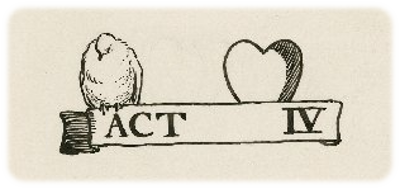Troilus and Cressida
Act IV, Scene 1
Troy. A street.
-
Enter at one door Aeneas with a torch; at another, Paris,
-
Deiphobus, Antenor, Diomedes the Grecian, and others with
-
torches.
Paris
1
-
See ho! Who is that there?
Deiphobus
2
-
It is the Lord Aeneas.
Aeneas
3 - 6
-
Is the Prince there in person?
-
Had I so good occasion to lie long
-
As you, Prince Paris, nothing but heavenly business
-
Should rob my bed-mate of my company.
Diomedes
7
-
That’s my mind too. Good morrow, Lord Aeneas.
Paris
8 - 11
-
A valiant Greek, Aeneas, take his hand,
-
Witness the process of your speech, wherein
-
You told how Diomed, a whole week by days,
-
Did haunt you in the field.
Aeneas
12 - 15
-
Health to you, valiant sir,
-
During all question of the gentle truce;
-
But when I meet you arm’d, as black defiance
-
As heart can think or courage execute.
Diomedes
16 - 20
-
The one and other Diomed embraces.
-
Our bloods are now in calm, and, so long, health!
-
But when contention and occasion meet,
-
By Jove I’ll play the hunter for thy life,
-
With all my force, pursuit, and policy.
Aeneas
21 - 26
-
And thou shalt hunt a lion that will fly
-
With his face backward. In humane gentleness,
-
Welcome to Troy! Now, by Anchises’ life,
-
Welcome indeed! By Venus’ hand I swear,
-
No man alive can love in such a sort
-
The thing he means to kill, more excellently.
Diomedes
27 - 31
-
We sympathize. Jove, let Aeneas live,
-
If to my sword his fate be not the glory,
-
A thousand complete courses of the sun!
-
But in mine emulous honor let him die,
-
With every joint a wound, and that tomorrow!
Aeneas
32
-
We know each other well.
Diomedes
33
-
We do, and long to know each other worse.
Paris
34 - 36
-
This is the most despiteful gentle greeting,
-
The noblest hateful love, that e’er I heard of.
-
What business, lord, so early?
Aeneas
37
-
I was sent for to the King, but why, I know not.
Paris
38 - 47
-
His purpose meets you; ’twas to bring this Greek
-
To Calchas’ house, and there to render him,
-
For the enfreed Antenor, the fair Cressid.
-
Let’s have your company, or if you please,
-
Haste there before us. I constantly believe
-
(Or rather call my thought a certain knowledge)
-
My brother Troilus lodges there tonight.
-
Rouse him and give him note of our approach,
-
With the whole quality wherefore. I fear
-
We shall be much unwelcome.
Aeneas
48 - 50
-
That I assure you.
-
Troilus had rather Troy were borne to Greece
-
Than Cressid borne from Troy.
Paris
51 - 53
-
There is no help.
-
The bitter disposition of the time
-
Will have it so. On, lord, we’ll follow you.
Aeneas
54
-
Good morrow, all.
Paris
55 - 58
-
And tell me, noble Diomed—faith, tell me true,
-
Even in soul of sound good-fellowship—
-
Who, in your thoughts, deserves fair Helen best,
-
Myself, or Menelaus?
Diomedes
59 - 71
-
Both alike.
-
He merits well to have her that doth seek her,
-
Not making any scruple of her soil,
-
With such a hell of pain and world of charge;
-
And you as well to keep her that defend her,
-
Not palating the taste of her dishonor,
-
With such a costly loss of wealth and friends.
-
He like a puling cuckold would drink up
-
The lees and dregs of a flat tamed piece;
-
You like a lecher out of whorish loins
-
Are pleas’d to breed out your inheritors.
-
Both merits pois’d, each weighs nor less nor more,
-
But he as he, the heavier for a whore.
Paris
72
-
You are too bitter to your country-woman.
Diomedes
73 - 79
-
She’s bitter to her country. Hear me, Paris:
-
For every false drop in her bawdy veins,
-
A Grecian’s life hath sunk; for every scruple
-
Of her contaminated carrion weight,
-
A Troyan hath been slain. Since she could speak,
-
She hath not given so many good words breath
-
As for her Greeks and Troyans suff’red death.
Paris
80 - 84
-
Fair Diomed, you do as chapmen do,
-
Dispraise the thing that they desire to buy,
-
But we in silence hold this virtue well,
-
We’ll not commend what we intend to sell.
-
Here lies our way.





